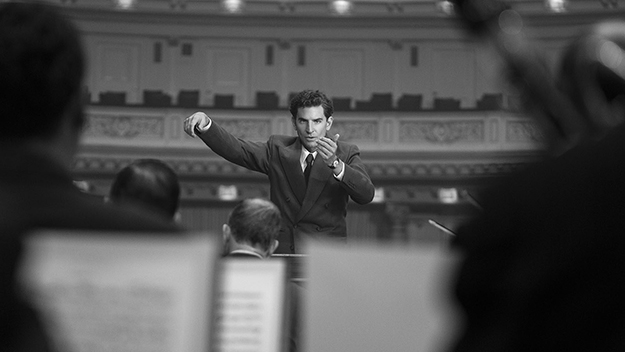Great Performances
This article appeared in the October 19, 2023 edition of The Film Comment Letter, our free weekly newsletter featuring original film criticism and writing. Sign up for the Letter here. Read and listen to all of our coverage NYFF61 here.

Maestro (Bradley Cooper, 2023)
In Maestro, the ambitious new film about the legendary conductor and composer Leonard Bernstein, music is not the main event. Instead, it functions as an interstitial element; music is there only in the in-between moments. The core of the movie, which screened earlier this month at the New York Film Festival, is Bernstein’s increasingly strained relationship with his wife, Felicia Montealegre (Carey Mulligan), who quietly deals with his repeated infidelities. Ever prim and proper, she is the glue that holds Bernstein’s life and career together, until she passes away of cancer at the age of 56.
Music is discussed in Maestro more than it is heard. There are subtle whiffs of melody, and conversations in which famous composers and symphonies are briefly mentioned. There are allusions to some of Bernstein’s greatest achievements during his long tenure with the New York Philharmonic, such as the Young People’s Concerts series, and mentions of his most beloved contribution to popular culture, the music for West Side Story (1957). And there are extremely short snippets of Bradley Cooper—who plays Bernstein passionately, along with directing and co-writing the movie—energetically conducting a full orchestra. Cooper has said in interviews that he first became enraptured with conducting at the tender age of 8, spending many hours vigorously shaking a baton, and indeed he seems to live for these moments in the film. But the orchestra scenes in Maestro—including a glorious performance of Mahler’s Second Symphony—are over almost as soon as they begin.
By focusing on Bernstein’s relationships with other people, and not his relationship to the music, the movie brings the conductor’s sometimes boorish and narcissistic qualities to the fore. We witness his rise to international stardom, but little of the effort that brought him there. He is brazen in his dalliances with men—a deep source of stress to his wife, who strives to maintain dignity and decorum, working behind the scenes to keep the household together. He loves her and stays married to her, but he is also a gay man, and their union is often complicated. When she dies, he falls apart, leaning harder into drinking and other excesses. But there are countless movies about relationships, and very few movies that go deep into the heart of music and creative expression. Maestro feels like a missed opportunity to explore the creative process and its connection with an artist’s life.
Priscilla, the new film by Sofia Coppola about Priscilla and Elvis Presley’s storied marriage, also struggles sonically. The movie does not use any of Elvis’s songs; Elvis Presley Enterprises apparently denied Coppola the use of his material. Instead, Thomas Mars, the lead singer of the French pop-rock band Phoenix and Coppola’s husband, pieced together a romantic vintage soundtrack for the film, including songs like Tommy James and the Shondells’ 1968 hit “Crimson and Clover,” Dolly Parton’s 1974 classic “I Will Always Love You,” and a new cover of Frankie Avalon’s swoony 1959 oldie “Venus.”
Baz Luhrmann’s 2022 Elvis—overall a better film—mixed some of Elvis’s songs with contemporary tunes by artists including Doja Cat and Eminem. The dreamlike repetition of Elvis’s music—in particular, the ghostly echoes of “Suspicious Minds”—throughout the movie becomes part of its psychological fabric. Luhrmann’s project is about more than Elvis; it is about America, and Elvis’s music is so eerily familiar, and so interlaced with American culture and history, that it invests the film with both contemporary and nostalgic potency.
One could argue that Elvis’s songs aren’t even necessary to Coppola’s film. After all, this is a story about Priscilla, adapted from her 1985 biography Elvis and Me, and it is of a piece with Coppola’s oeuvre of delicately textured movies exploring the inner lives of female protagonists. Priscilla was only 14 when she met Elvis, while he was stationed in West Germany for military service. On screen, their relationship slowly blooms—Cailee Spaeny, who is in her mid-20s, is uncannily youthful and convincing as a teenage Priscilla—and then slowly and inexorably unravels. The film follows suit, with the cinematic magic of the early scenes of courtship dissipating as the narrative progresses. As Priscilla grows older, and the emotional and physical distance between her and Elvis increases, the biopic seems to run out of steam. Elvis (a lanky and laconic Jacob Elordi) is charming, but without any of the King’s actual music or onstage charisma on view, he comes across as a handsome, garden-variety jock, callous and controlling in his marriage to Priscilla while simultaneously cheating with other women and popping prescription pills.
Elvis’s music is necessary—not just as period wallpaper, but because it humanizes and redeems Elvis to some degree, and conveys his magnetic power. Coppola may have not wanted to deify Elvis or make him the star, but without the remarkable artistry of his performances, he comes across as so self-centered and vain that one wonders why anyone would be with him at all. The sublime, pastel-hued set and vintage costume design notwithstanding, the film feels strangely empty and lacking in emotion—not just because music, the driving force of Elvis’s life, is missing, but because Priscilla tells a story of infatuation, yet shows little of love. Elvis and Me, in contrast, begins with Priscilla’s tearful chronicling of her reaction to Elvis’s death; though she had divorced Elvis a few years prior to his passing, her bond with him was still strong. Her love for Elvis is much more palpable in the book, because her accounts are filled with tenderness even when discussing the darkest moments of their relationship.
Where Priscilla is restrained, Maestro spills over with feeling. Cooper embodies Bernstein with incredible energy and enthusiasm, and the film is directed with gusto, but without access to the musical side of his subject, we are left with only half a portrait. Without a powerful fusion of sound and vision, and without grappling with the creative urges that inspired their subjects, both of these works can only go so deep.
Geeta Dayal is an arts critic and journalist based in Los Angeles. She is the author of Another Green World, a book on Brian Eno.







